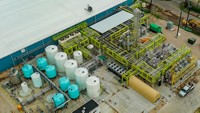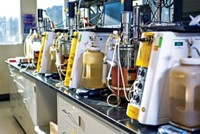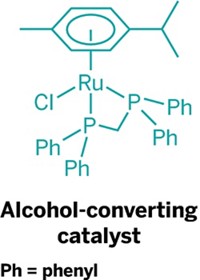Advertisement
Grab your lab coat. Let's get started
Welcome!
Welcome!
Create an account below to get 6 C&EN articles per month, receive newsletters and more - all free.
It seems this is your first time logging in online. Please enter the following information to continue.
As an ACS member you automatically get access to this site. All we need is few more details to create your reading experience.
Not you? Sign in with a different account.
Not you? Sign in with a different account.
ERROR 1
ERROR 1
ERROR 2
ERROR 2
ERROR 2
ERROR 2
ERROR 2
Password and Confirm password must match.
If you have an ACS member number, please enter it here so we can link this account to your membership. (optional)
ERROR 2
ACS values your privacy. By submitting your information, you are gaining access to C&EN and subscribing to our weekly newsletter. We use the information you provide to make your reading experience better, and we will never sell your data to third party members.
Business
Start-up Firms Pursue Biofuels
Entrepreneurs invigorate search for economical biomass-based fuels
by Marc S. Reisch
November 20, 2006
| A version of this story appeared in
Volume 84, Issue 47
COVER STORY
Start-up Firms Pursue Biofuels
Start-up businesses are eager to enter the biofuels arena. One firm, New Century Lubricants, says it has discovered new catalysts that overcome the limitations of conventional methods of biodiesel production. Another firm, Kergy, claims to have developed an anaerobic process to make ethanol from cellulose.
Producers typically make biodiesel by combining oils and fats with methanol and a catalyst, such as sodium hydroxide or potassium hydroxide. The process also makes a significant amount of glycerin as a by-product. William Summers, president of New Century, says his firm has an exclusive license on a technology developed at the National Chemical Laboratory (NCL) of India that substitutes bimetal salt catalysts for hydroxide-based catalysts.
In addition to making biodiesel, New Century's two-step technology also converts the leftover and often unwanted glycerin to di- and tri-ethers of glycerin. These ethers can in turn be used as oxygenates that are added back into the diesel to reduce particulate emissions, Summers says. New Century plans to build a pilot plant in India. NCL scientists will operate the plant, using it to evaluate the technology and its performance with a variety of feedstocks.
An advantage to New Century's process is that it can use "less expensive unrefined oils in a truly continuous process that generates no wastewater," says Summers, who is based in Des Moines, Iowa. In addition, by reacting oils and fats with a higher molecular weight alcohol, such as octanol, the process can be used to make lubricants, he says. Should the dual-purpose process prove out, Summers says he hopes to license the fuels technology to biodiesel makers. New Century itself plans to use the process to become a lubricant maker.
Kergy, based in Broomfield, Colo., is a start-up firm underwritten by Vinod Khosla, a cofounder of computer maker Sun Microsystems. The firm uses what it calls a thermal anaerobic conversion process to "produce more ethanol for a given amount of energy expended than is possible with any other competing process." Kergy claims that its process turns plant cellulose into ethanol without the need for more conventional enzymes and fermentation organisms.
C&EN contacted Arie Geertsema, Kergy's senior vice president of technology, to learn more about the firm's distinct know-how. Geertsema, whose r?sum? includes a 10-year stint as director of R&D at Fischer-Tropsch chemistry firm Sasol, returned the call only to say that Kergy is "not looking for publicity at this time." However, the firm's website offers some intriguing insights into its technology.
Kergy heats biomass in an oxygen-free environment to produce carbon monoxide and hydrogen. It then reconstitutes these gases into various alcohols, including ethanol, in a process that takes just minutes instead of days. The firm contends that its process should be competitive in costs with ethanol from corn fermentation.
The conversion apparently involves some form of catalyst. According to a help-wanted advertisement appearing in the Oct. 16 issue of C&EN, Kergy is looking for a director of catalysis to "optimize an existing and a novel catalyst or catalyst combinations for the conversion of syngas to alcohols." To test the new catalysts, the firm is also building an experimental laboratory and pilot-scale reactors in Colorado, according to the advertisement.





Join the conversation
Contact the reporter
Submit a Letter to the Editor for publication
Engage with us on Twitter